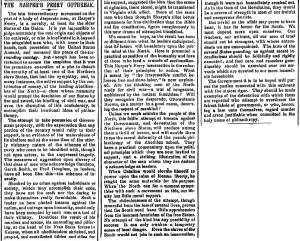Record Data
Transcription
The Harpers Ferry Outbreak
The late insurrectionary movement on the part of a body of desperate men, at Harper’s Ferry, is a novelty, at least for the older states of the Union. It is yet impossible to judge accurately the real origin and objects of the outbreak, or who is implicated in it beyond the misguided men who, with arms in their hands, took possession of the United States Arsenal, and menaced the peace of the surrounding country. But enough has been ascertained to arouse the suspicion that it was the premature execution of a plot to disturb the security of at least two of the Northern slave States, that had the sympathy, and, in many instances, the active support by the contribution of money, of the leading Abolitionists of the North-a class whose humanity would prompt the desolation of our States by fire and sword, the kindling of civil war, and even the disruption of the confederacy, to accomplish their irrational ideas of philanthropy.
The attempt to take possession of Government property, with the expectation that any portion of the country would rally to their support, is an evidence of the malevolence of its abettors and at the same time the utterly visionary nature of the schemes of the party who seem to be identified with, though not in open action, in the supposed tragedy. That measures of aggression upon slavery of that class of men who acknowledge Garrison, Gerrit Smith, or Fred Douglas [Douglass], as leaders, have all been like this-the schemes of insanity.
Shocked by no crime against individuals or society, which may accomplish their ends, they have not the craft nor the daring to make themselves really formidable. Such a leader as here plotted treason against the nation, and outrage upon humanity, could only have been accepted by such men as a tool of their villainy. Doubtless the results of his murders and arsons, his maranding and pilfering, at the head of the Free State forces in Kansas, when all abolitiondom shrieked, and prayed, and contributed bibles and rifles for his support, suggested the idea that the scene of agitation, there closed, might be transferred to Virginia with some effect. Some of the same men who then thought Sharpe’s rifles better arguments for free civilization than the Bible and the constitution, figure conspicuously in this new drama of attempted bloodshed.
We cannot but hope, as the result has been so different from what its leaders anticipated, that its lesson will be salutary upon the public mind at the North. Here is presented a practical exposition of the humanity and love of those who lead a crusade of sectionalism. This Harpers Ferry insurrection is the reduction of their principles to action. What is meant by “the irrepressible conflict between free and slave labor,” is now explained. Are the thinking men of the North ready for civil war-a war of vengeance, embittered by the hottest fanaticism? Will they recognize the desperado, Ottowotomie Brown, as a martyr in a good cause, deserving the respect of mankind?
Unless we much mistake the people of the North, this futile attempt at treason against the Government, and devastation of the Northern slave States, will produce among them a thrill of horror, and will enable them to see the moral deformity of pseudo philanthropy of the Abolition school. They have a practical commentary upon the political principles which they are now invited to support, and a striking illustration of the character of the men whom they are desired to acknowledge as leaders.
When Cataline would elevate himself to power upon the ruins of Roman liberty, he sought the same materials for his purpose. When the North can for a moment sympathize with such a movement as this, our liberty has little moral support.
The ridiculousness of the attempt, though mournful from the loss of several lives, proves that the South need have little apprehension from the insanest fanaticism of the Free States. No attempt of the kind has any possibility of success. It can only awaken a temporary sense of local danger. Even the slaves of the South would not join in such an insurrection, though it were not immediately crushed out. As in the time of the Revolution, they would be a source of strength in most of our fruitful and prosperous districts.
But trivial as the affair may prove to have been, it has its lessons for the South. We must depend more upon ourselves. Our teachers, our artisans, all our men of trust should not be strangers, with whose antecedents we are unacquainted. The laws of the several States guarding us against secret incendiarisms should be faithfully and rigidly executed; and that care and ceaseless guardianship should be exercised over our servants which are devoted to our more immediate households.
The Government it is to be hoped will pursue the parties connected with this outbreak with the utmost rigor. They should be made examples of the detestation with which those regarded who attempt to overthrow the fairest fabric of government, or who, becoming a law unto themselves, regard murder and arson justifiable whom committed in the holy name of philanthropy.






